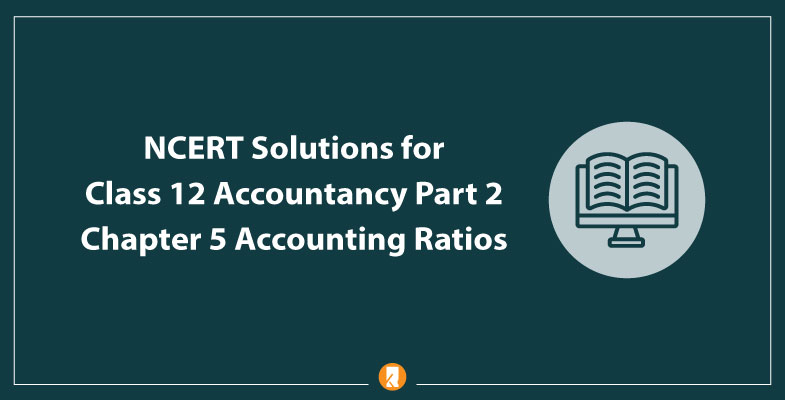NCERT Solutions for Class 12 Accountancy Part 2 Chapter 5 Accounting Ratios: Download NCERT Solutions for CBSE Class 12 Accountancy Part 2 Chapter 5 with a single click on the pdf link provided in this article. All the concepts that you learn here are related to a company’s financial statements, including the balance sheet. After going through the Class 12 Accountancy chapter 5, you will learn the different techniques of analyzing accounting ratios along with their benefits and apply the same in the board exams or when you pursue higher studies.
- All you need to know about NCERT Solutions for Class 12 Accountancy
NCERT Solutions for Class 12 Accountancy Part 2 Chapter 5 -Accounting Ratios
Class 12 Accountancy Part 2 Chapter 5 NCERT Solutions
Download Class 12 Accountancy Part 2 Chapter 5 NCERT Solutions PDF
Users of a financial ratio, current, and liquidity ratio, solvency position of the organization, significant profitability measures, managers, investors, long-term creditors, solving balance sheets, proprietary ratio, and much more are covered in NCERT solutions Class 12 Accountancy Part 2 Chapter 5.
To master a subject, you must first analyze, solve, practice, and then revise it in a systematic manner.
Class 12 Accountancy Part 2 Chapter 5 Accounting Ratios – Overview
Ratios are numbers that set up the relationships between two or more numbers. You express ratios in terms of fractions or percentages. Similarly, accounting ratios are those ratios derived from financial statements.
You can also set up relationships between two numbers in a financial statement using a ratio analysis technique. For this, you must reorganize and interpret financial data using arithmetic relations. However, you will also need to know the rules that go into making a financial statement.
The technique of ratio analysis helps financial analysts in four ways.
- It lets them know the strengths and weaknesses of the business.
- It effortlessly allows them to evaluate those areas that need attention.
- It lets them compare and analyze the data on industry standards.
- It allows them to predict the current standing and future outcomes of the business.
So, if done right, ratio analysis can help you to understand the efficiency of the business. It also helps the management assess those areas that need improvement and revamp their strategies to get the company back on track.
After having gone through the chapter, you now know what accounting ratios are and how to analyze them. You have also learned the limitations of ratio analysis. Once you are thorough with these topics, you can answer the questions at the end of the chapter and prepare for the board exams.
Concepts covered in NCERT Solutions for Class 12 Accountancy Part 2 Chapter 5
- Meaning of accounting ratios
- Objectives of accounting ratios
- Types of ratios
- Liquidity ratios
- Solvency ratios
- Profitability ratios
Highly Important Links For CBSE Class 12 Accountancy
NCERT books and solutions are available for download as PDF. So, you can download them here, and start preparing for the exams:
Benefits of NCERT Solutions for Class 12 Accountancy Part 2 Chapter 5
There are few benefits of going through the chapter-wise solutions from NCERT, for chapter five of Part Two in Accountancy for CBSE class 12, which you will find in the following sections.
1. Conciseness
All the concepts in Chapter five that are present in the solutions are easy to understand. So, you will be able to grasp them quickly.
2. Benefits of Analyzing Accounting Ratios
By going through the chapter using the solutions, you will know what accounting ratios are or how to analyze them and their benefits and significance concerning the company’s financial statements.
3. Free of Cost
The chapter-wise solutions from NCERT for Accountancy for CBSE class 12 are available to download as PDF and are free of cost. So, you can download them from various partner websites and start studying for the exams.
4. Essential Concepts
Analyzing accounting ratios is an essential concept in Accountancy, not only for the exams but also for jobs or pursuing higher studies. You will be applying the concepts you learn when you pursue higher education or on the job.
We have covered the detailed guide on CBSE NCERT Solutions for Class 12 Accountancy Part 2 Chapter 5. Feel free to ask any questions in the comment section below.
FAQs on NCERT Solutions for Class 12 Accountancy Part 2 Chapter 5
Is it possible to get the NCERT Solutions for Class 12 Accountancy Part 2 Chapter 5 for free?
Yes, students can get the NCERT Solutions for Class 12 Accountancy Part 2 Chapter 5 in PDF format for free from the above article.
What are the liquidity ratios?
Liquidity ratios are a type of ratio that helps measure a company’s ability to pay back existing debts.
What exactly is the Debt Equity Ratio?
Debt equity ratio is a ratio that illustrates the relationship between the owner’s and borrower’s funds.
What is the current ratio’s significance?
The current ratio’s importance can be seen in the following situations.
The availability of current assets in proportion to current liabilities aids in determining creditor security and the essence of safety.
What are the benefits of the CBSE NCERT Solutions for Class 12 Accountancy Part 2 Chapter 5?
Go through the above blog for the benefits of solving NCERT Solutions for Class 12 Accountancy Part 2 Chapter 5.
